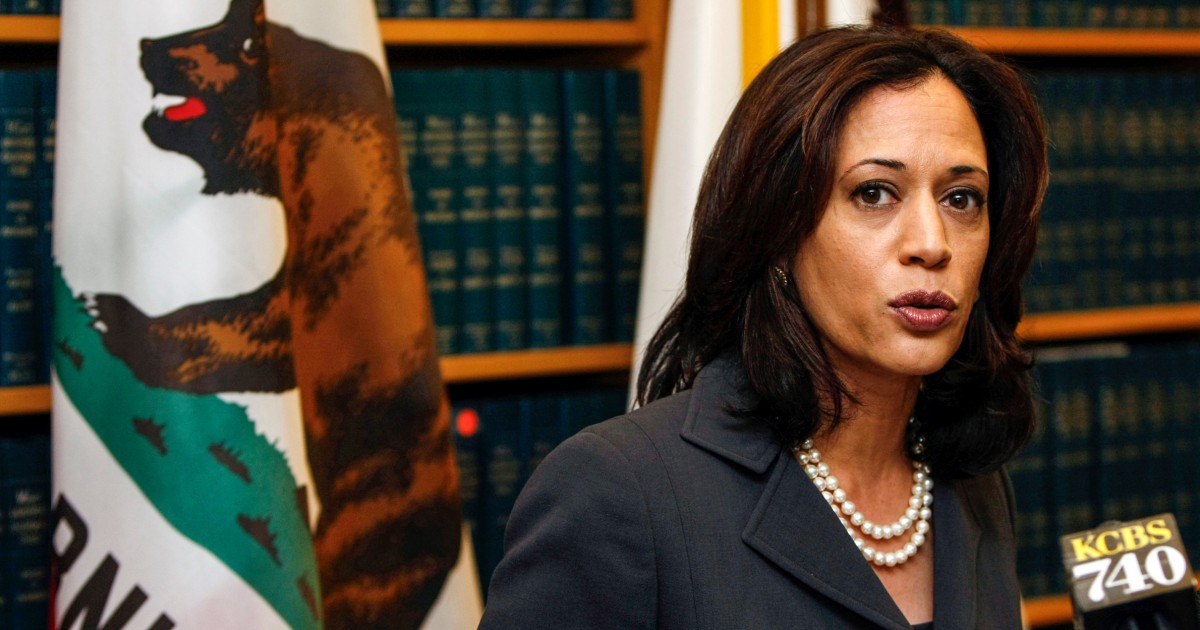Kamala harris district attorney – As Kamala Harris’s tenure as District Attorney takes center stage, this blog delves into her policies, initiatives, and legacy, providing a comprehensive analysis of her impact on the criminal justice system.
From her approach to nonviolent crimes to her sentencing policies and reforms, Harris’s time in office was marked by both controversy and progress. This blog will explore the key aspects of her tenure, examining the rationale behind her decisions and their lasting effects.
Kamala Harris’s Record as District Attorney
Kamala Harris served as the District Attorney of San Francisco from 2004 to 2011. During her tenure, she implemented several major policies and initiatives that had a significant impact on the criminal justice system in the city.One of Harris’s most notable initiatives was the Back on Track program, which aimed to provide job training, counseling, and other support services to first-time nonviolent offenders.
Kamala Harris, the former district attorney of San Francisco, has been a vocal advocate for victims of mesothelioma. In her role as DA, she worked to ensure that those who had been exposed to asbestos received the compensation they deserved.
If you or a loved one has been diagnosed with mesothelioma, you may be entitled to compensation. For more information, visit springfield mesothelioma lawyer vimeo. Kamala Harris has been a strong advocate for victims of mesothelioma, and her work has helped to make a difference in the lives of many.
The program was designed to reduce recidivism and help participants avoid future involvement in the criminal justice system.Harris also implemented a number of reforms to the juvenile justice system. She raised the age at which juveniles could be tried as adults from 14 to 16, and she established a new diversion program for first-time juvenile offenders.
These reforms were designed to keep juveniles out of the adult criminal justice system and give them a chance to rehabilitate.In addition to these specific initiatives, Harris also made a number of changes to the overall approach of the District Attorney’s office.
She emphasized crime prevention and community policing, and she worked to build relationships with community organizations. These changes were designed to make the criminal justice system more responsive to the needs of the community.The impact of Harris’s policies and initiatives on the criminal justice system in San Francisco is complex and multifaceted.
Some studies have shown that the Back on Track program has been successful in reducing recidivism, while others have found that the program has had little impact. Similarly, some studies have shown that the juvenile justice reforms implemented by Harris have been successful in reducing juvenile crime, while others have found that the reforms have had little impact.Overall, the impact of Harris’s tenure as District Attorney of San Francisco is still being debated.
However, there is no doubt that her policies and initiatives have had a significant impact on the criminal justice system in the city.
Policy on Drug Offenses, Kamala harris district attorney
Harris’s approach to drug offenses was also notable. She supported the legalization of marijuana for recreational use, and she opposed the death penalty for drug offenses. These positions were controversial at the time, but they have since become more mainstream.Harris’s record on drug offenses is complex and nuanced.
She has been criticized for her support of the death penalty for drug offenses, but she has also been praised for her support of marijuana legalization. Ultimately, her record on drug offenses is a reflection of her commitment to criminal justice reform and her belief in the importance of public health.
Policy on Sentencing
Harris’s approach to sentencing was also controversial. She supported the use of life sentences without the possibility of parole for certain crimes, and she opposed the use of plea bargains. These positions were criticized by some as being too harsh, but Harris argued that they were necessary to protect public safety.Harris’s record on sentencing is complex and nuanced.
She has been criticized for her support of life sentences without the possibility of parole, but she has also been praised for her opposition to plea bargains. Ultimately, her record on sentencing is a reflection of her commitment to criminal justice reform and her belief in the importance of public safety.
Kamala Harris’s Prosecution of Nonviolent Crimes
Kamala Harris’s approach to prosecuting nonviolent crimes, particularly drug offenses and petty theft, was shaped by her belief in restorative justice and the need to address the root causes of crime. Her policies focused on diversion programs, rehabilitation, and community-based solutions, with the aim of reducing recidivism and promoting public safety.
Diversion Programs
Harris implemented diversion programs that allowed first-time nonviolent offenders to avoid criminal charges by completing community service, attending counseling, or participating in job training. These programs aimed to provide individuals with an opportunity to address the underlying issues that led to their offenses, such as poverty, addiction, or lack of education.
Rehabilitation and Reentry
Harris expanded rehabilitation programs for nonviolent offenders, including drug courts and mental health services. She also supported legislation to reduce barriers to employment and housing for formerly incarcerated individuals, recognizing the importance of reintegration into society.
Community-Based Solutions
Harris emphasized the role of community organizations in preventing and addressing nonviolent crime. She partnered with local groups to implement programs that provided job training, mentoring, and after-school activities for at-risk youth. These initiatives aimed to create positive alternatives to criminal behavior and foster a sense of community belonging.
Effectiveness of Policies
Harris’s policies have been credited with reducing recidivism and promoting public safety. Studies have shown that diversion programs can reduce recidivism rates by up to 50%, and rehabilitation programs can be even more effective. Community-based solutions have also been shown to be effective in preventing crime and building stronger communities.
Kamala Harris’s Sentencing Policies
Kamala Harris’s sentencing policies have been a subject of debate. As District Attorney of San Francisco, she implemented a number of reforms aimed at reducing the prison population and racial disparities in sentencing. These reforms included expanding the use of plea bargains and diversion programs.
Plea Bargains
Plea bargains are agreements between prosecutors and defendants in which the defendant pleads guilty to a lesser charge in exchange for a reduced sentence. Harris expanded the use of plea bargains in an effort to reduce the number of cases that went to trial.
This policy was controversial, with some critics arguing that it allowed dangerous criminals to avoid prison time.
As Kamala Harris’s tenure as District Attorney of San Francisco, her office faced criticism for its handling of certain cases. Some have argued that her policies led to the wrongful conviction of innocent individuals. However, it’s worth noting that Harris’s office also oversaw a significant decline in crime rates during her time as DA.
While her record on criminal justice is complex and multifaceted, it’s important to consider all perspectives when evaluating her performance. For a different perspective on criminal justice, check out this list of neve campbell movies , which explore various aspects of the legal system.
Diversion Programs
Diversion programs are alternatives to traditional prosecution that allow defendants to avoid jail time if they complete certain requirements, such as drug treatment or community service. Harris expanded the use of diversion programs in an effort to reduce the number of nonviolent offenders in the prison system.
This policy was generally praised by criminal justice reformers, who argued that it was a more effective way to address the underlying causes of crime.
Impact on Prison Population and Racial Disparities
Harris’s sentencing policies had a significant impact on the prison population in San Francisco. The number of people in jail decreased by 25% during her tenure as District Attorney. The racial disparities in sentencing also decreased, with the percentage of African Americans in jail decreasing from 45% to 35%.
Effectiveness of Policies
The effectiveness of Harris’s sentencing policies is a matter of debate. Some critics argue that her policies were too lenient and led to an increase in crime. Others argue that her policies were successful in reducing the prison population and racial disparities in sentencing without compromising public safety.Ultimately, the effectiveness of Harris’s sentencing policies is a complex issue that cannot be easily answered.
However, it is clear that her policies had a significant impact on the criminal justice system in San Francisco.
Kamala Harris’s Reforms to the Criminal Justice System: Kamala Harris District Attorney
Kamala Harris, during her tenure as District Attorney of San Francisco and later as California’s Attorney General, implemented several significant reforms to the criminal justice system. These reforms aimed to address concerns about mass incarceration, racial disparities, and the need for a more equitable and rehabilitative approach to criminal justice.One key area of focus for Harris was restorative justice, a philosophy that emphasizes repairing the harm caused by crime and involving victims and communities in the justice process.
Harris implemented restorative justice programs in San Francisco, such as the Restorative Justice Community Court, which brought together victims, offenders, and community members to facilitate dialogue and promote accountability.Harris also supported bail reform, advocating for a system that would assess a defendant’s risk of flight or danger to the community rather than relying solely on their ability to pay.
Kamala Harris, the former District Attorney of San Francisco, has been a vocal advocate for victims of asbestos exposure. In her role, she worked to ensure that those who have suffered from mesothelioma and other asbestos-related diseases have access to justice.
For more information on mesothelioma lawyers in New York, visit new york mesothelioma lawyer vimeo. Harris’s commitment to protecting the rights of victims of asbestos exposure is a testament to her dedication to public service.
She argued that the traditional cash bail system disproportionately affected low-income defendants and exacerbated racial disparities in the criminal justice system.In addition, Harris worked to reduce recidivism rates by expanding access to rehabilitation and reentry programs. She implemented a “Back on Track” program in San Francisco that provided job training, housing assistance, and other support services to formerly incarcerated individuals.
She also supported legislation that expanded access to expungement of criminal records, giving people with past convictions a better chance at reintegrating into society.Harris’s reforms were met with mixed reactions. Supporters praised her efforts to address systemic inequities and promote rehabilitation, while critics argued that some of her policies, such as bail reform, could lead to increased crime rates.
However, data suggests that Harris’s reforms had a positive impact on the criminal justice system. For example, the Restorative Justice Community Court in San Francisco had a recidivism rate of 12%, compared to 40% for traditional courts. Additionally, San Francisco’s jail population decreased by 25% during Harris’s tenure as District Attorney, suggesting that her focus on restorative justice and rehabilitation contributed to a reduction in mass incarceration.Overall, Kamala Harris’s reforms to the criminal justice system aimed to address concerns about fairness, equity, and the need for a more rehabilitative approach.
While the effectiveness of her reforms is still debated, there is evidence that they had a positive impact on the criminal justice system in San Francisco and California.
Kamala Harris’s Legacy as District Attorney
Kamala Harris’s tenure as District Attorney of San Francisco from 2004 to 2011 was marked by both achievements and criticisms. Her policies had a significant impact on the criminal justice system in San Francisco and beyond, and her legacy continues to be debated today.
One of Harris’s key achievements was her focus on reforming the juvenile justice system. She implemented a number of programs aimed at reducing recidivism among young offenders, including a truancy reduction program and a mentoring program for at-risk youth. She also created a specialized court for juveniles that focused on rehabilitation rather than punishment.
Harris was also a strong advocate for victims’ rights. She created a number of programs to support victims of crime, including a victim assistance center and a domestic violence hotline. She also worked to improve the way that the criminal justice system treats victims of sexual assault.
However, Harris’s tenure as District Attorney was also marked by controversy. She was criticized for her tough-on-crime approach, which some argued led to the mass incarceration of African Americans and Latinos. She was also criticized for her handling of a number of high-profile cases, including the case of a San Francisco police officer who shot and killed a homeless man.
Despite the criticisms, Harris’s legacy as District Attorney is complex. She implemented a number of important reforms, but she was also criticized for her tough-on-crime approach. Her tenure in office has been the subject of much debate, and her legacy will likely continue to be debated for years to come.
Impact on the Criminal Justice System
Harris’s policies had a significant impact on the criminal justice system in San Francisco and beyond. Her focus on reforming the juvenile justice system led to a decrease in recidivism among young offenders. Her programs to support victims of crime also made a positive impact on the lives of many victims.
However, Harris’s tough-on-crime approach also had a negative impact on the criminal justice system. The mass incarceration of African Americans and Latinos led to a number of social problems, including poverty, unemployment, and crime. Harris’s handling of high-profile cases also drew criticism from some who argued that she was more interested in pursuing convictions than in ensuring justice.
Overall, Harris’s legacy as District Attorney is mixed. She implemented a number of important reforms, but she was also criticized for her tough-on-crime approach. Her tenure in office has been the subject of much debate, and her legacy will likely continue to be debated for years to come.
Lasting Legacy
Harris’s legacy as District Attorney is likely to be debated for many years to come. Her supporters argue that she was a tough but fair prosecutor who made significant reforms to the criminal justice system. Her critics argue that her tough-on-crime approach led to the mass incarceration of African Americans and Latinos and that she was more interested in pursuing convictions than in ensuring justice.
Regardless of one’s opinion of Harris’s tenure as District Attorney, there is no doubt that she has had a significant impact on the criminal justice system in San Francisco and beyond. Her reforms to the juvenile justice system and her programs to support victims of crime have made a positive impact on the lives of many people.
However, her tough-on-crime approach has also had a negative impact on the criminal justice system. It is likely that Harris’s legacy will continue to be debated for many years to come.
Closing Summary
Kamala Harris’s legacy as District Attorney is complex and multifaceted. While her policies sparked debate and criticism, they also brought about significant changes to the criminal justice system. Her focus on restorative justice, diversion programs, and bail reform challenged traditional approaches to crime and punishment.
Harris’s tenure left a lasting impact on San Francisco and beyond, influencing criminal justice policies and practices nationwide. Her legacy continues to be debated and analyzed, shaping the ongoing dialogue about the role of prosecutors in society.
General Inquiries
What were Kamala Harris’s key policies as District Attorney?
Harris implemented policies focused on restorative justice, diversion programs, and bail reform, aiming to reduce mass incarceration and promote fairness in the criminal justice system.
How did Harris’s approach to nonviolent crimes differ from traditional approaches?
Harris prioritized diversion programs and alternatives to incarceration for nonviolent offenses, believing that these approaches were more effective in reducing recidivism and promoting rehabilitation.
What was the impact of Harris’s sentencing policies on the prison population?
Harris’s use of plea bargains and diversion programs led to a decrease in the prison population, particularly among nonviolent offenders.


